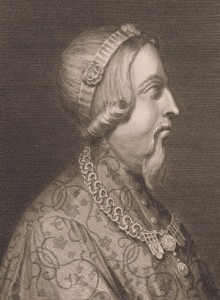 Whilst Chaucer may be the most remembered writer of this era, John Gower was also a noted poet and is known for three epic poems that were both moral and political comments on the times. Born in Kent around 1330, nothing much is known about Gower’s early life although it is thought that he was from a well-to-do Yorkshire family who had properties across the English counties.
Whilst Chaucer may be the most remembered writer of this era, John Gower was also a noted poet and is known for three epic poems that were both moral and political comments on the times. Born in Kent around 1330, nothing much is known about Gower’s early life although it is thought that he was from a well-to-do Yorkshire family who had properties across the English counties.
Well educated, Gower went on to live in London where he is thought to have taken up the practice of law. He may also have been privy to the King’s court of the time as he talks of meeting Richard II by chance on the river and being invited to board his Royal boat. It is not known how deep this relationship was and in later years Gower did switch his allegiance to the future king, Henry.
What is more certain is that Gower was a close associate of Geoffrey Chaucer, the author of The Canterbury Tales. When Chaucer went abroad, he gave Gower legal authority to handle his affairs during his absences and there are also several indications in their written work that they admired each others poetic endeavors.
Whilst he may have produced less works than his more famous contemporary, Gower did write on a variety of subjects including religion, politics and the moral issues of the day. His way of doing this was to employ allegories or extended metaphors, conveying a deeper meaning through the actions and deeds of characters in his poems.

Gower began by writing ballades which he later brought together in a publication called Cinkante Ballades but his first major work is generally considered to be Mirour de l”Omme, a long poem of some 30,000 lines which was written in French. In the poem, Gower explored two of his favorite subjects, that of morality and its association to religion.
For his next major poem, Gower turned to Latin and the use of elegiac verse. Vox Clamantis was 10,000 lines that dwell upon an actual event of the time – the peasant’s revolt in 1381 – and the way society had become so corrupt that evil and the anti-Christ were about to follow. As a poem it also provides an insight into life in London under the reign of Richard II.
Gower’s last major work is Confessio Amantis or The Lover’s Confession which is about 33,000 lines long and was composed at the behest of Richard II himself. Of all of Gower’s works, this one alone stands up to the poems of Chaucer and other well-known writers of the time.

It is generally thought that Gower took around 4 years to complete the full poem, between 1386 and 1390, and it consists of a number of individual stories brought together in two books. The poem was quite popular at the time as is revealed by the number of original manuscripts that still remain. Whilst he may have suffered by comparison to his friend, Chaucer, Gower is still considered one of the most important poets of this early period in English literature.
He is thought to have died in 1408 and was buried in what is now Southwark Cathedral.

